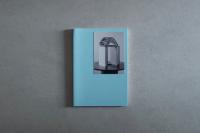Subscribe to the Newsletter
Your cart is empty
Shop now

A Der Greif reading on our community winning and shortlisted artists at Dummy Award ‘23
From time to time, we look out for our alumni's achievements in the photography world, catching up with them through Q&As or supporting their new works. On the occasion of the Dummy Award '23 showcase at the Leipzig Photobook Festival, we introduce our community artists' winning and shortlisted photobooks among the 50 dummies running for the final prize.
The Dummy Award, formerly known as the Kassel Dummy Award, is one of the most important international competitions for the best unpublished photobook dummies of the year. In 2023, The Kassel Dummy Award was continued as the Dummy Award by the PhotoBooksMuseum in Cologne. Der Greif introduces the photobooks presented by 8 of our alumni among the 50 shortlisted books, selected by jurors Angela Ferreira, Anastasiia Leonova, Frederic Lezmi, Anja Schürmann, Nicolas Polli, and Ufuk Sahin.










Published by Void, Carlos Alba's "I'll Bet the Devil My Head" is a contemporary urban tale in the realm of documentary photography. While objectively narrating the lives of foxes in London, specifically in the borough of Tower Hamlets, where the child poverty rate is the highest at 43%, Alba also delves into the realm of fables. Fables are short stories, typically featuring animals as characters, that convey a moral. The narrative draws a parallel between the behaviors of both people and foxes in their struggle to survive in the city. They face challenges due to high costs and difficulties in meeting expenses, as well as the increasingly unnatural environments where foxes are found.












Igor Chekachkov's "100 Days of War" is a diaristic, non-fictional notebook story from the war zone of Ukraine. The alternation of Polaroids and hand-written thoughts recorded day by day brings the narrative to a grounded level of authenticity and intimacy, while remaining solid in lucidity, objectivity, and fidelity to reality. During the first months of the war, the artist left his home and started a new life in Lviv, working as a photographer and a fixer. He took photographs every day and printed them with his Instax printer to put into the notebook, resulting in a recording of a changing country and community throughout an unending war.












Jansen van Staden's "Some" is a deliberate conversation with David Goldblatt's seminal book, published in 1975, "Some Afrikaners Photographed". The collection of documentary photographs – shot between 2009 and 2022 – refers back to Goldblatt's photographs of the contradictory Afrikaner nation in the midst of Apartheid: a nation that is resilient, staunchly religious, but also racist. This contradiction informed Goldblatt's motivations for looking at the Afrikaner, while questioning van Staden's positionality as a 'some' Afrikaner himself.












"Hun" is a nine-chapter story that explores the Western gaze and the structured conception of nature. Julia Mejnertsen, the author of this shortlisted photobook, delves deep into the topic of animal hunting through the story of her mother, who used to hunt in South Africa. This long-term project, which began in 2013, presents a rich narrative that questions the role of an activity that is deeply ingrained in humanity. The use of juxtapositions of photographs, drawings, letters, videos, objects, and texts allows for multiple interpretations, offering psychological, historical, and cultural perspectives while intertwining Mejnertsen's personal story with a collective one.












In Luca Iovino's photobook "The Name We Hold," black and white aesthetics rhythmically enhance the imagery of the dark and mysterious narrative. The book explores themes and symbols that guide the photographer in illuminating a fundamental question: where does memory reside? Could it be found within the people themselves, the homes they occupy, or even within the dreamlike and surreal aspects of reality? These elements form a boundary within which Iovino conducts his visual exploration, seeking to define the concept of home and a sense of security during times of displacement and life transitions.












"The Weight of the Word" is photographer Piero Martinello's latest book, made in collaboration with historian Piero Casentini, on cases of eponymy involving nine Nazi doctors and researchers. Textual and visual documents from libraries and archives or from medical texts still in use allow for a sharp reconstruction of the personal history of these doctors, their research, and, in some cases, the "damnatio memoriae" that followed the condemnation of their work. "The Weight of the Word" is a complex work that mediates historical facts, where images play a key, yet ambiguous, role in transmitting information and ethics through aesthetics.


















Among the winning entries is Rafael Roncato's "Tropical Trauma Misery Tour": a bold, commercial, and pop photobook. It has everything needed to be in common with media visual language to tell a story of propaganda, speculative fake news, and farce in the context of the Brazilian Bolsonaro era. A parodic play unfolds throughout the book, where documentary and staged images, Internet language, and meta-photos intertwine to tell a myth - the myth of Bolsonaro being stabbed during a presidential rally campaign.












Russ Thompson's "A Wilderness" is an exploration of the changes in the perception of nature in light of new technologies used to represent and model the world. It also examines the implications of these technologies on our relationship with nature. The author argues that the boundaries between what is human or natural, real or unreal, have become increasingly blurred. In "A Wilderness," this concept is approached both conceptually through the content and practically through the use of various photographic and digital techniques that intentionally blur the line between the real and the unreal.